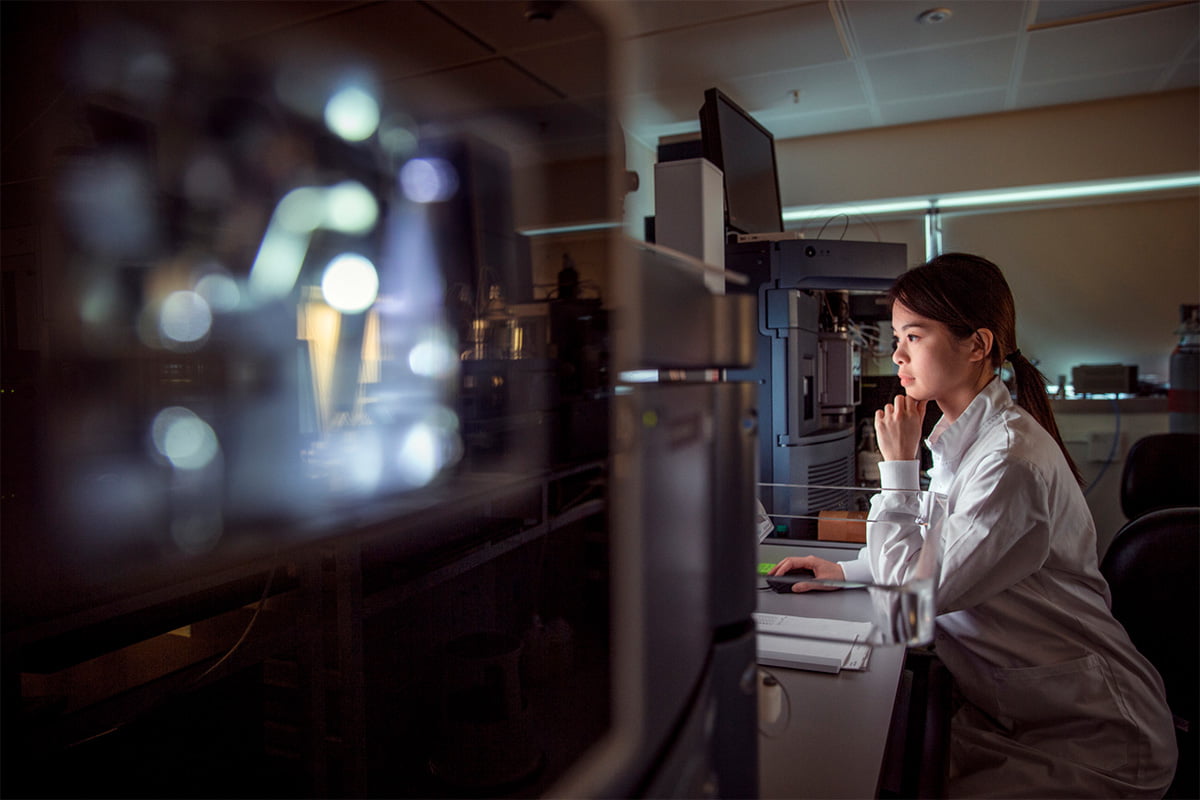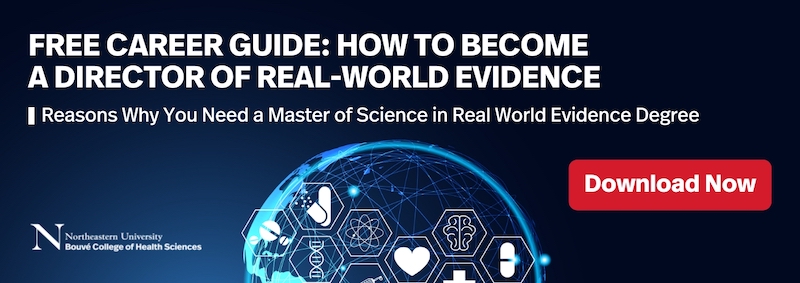Real-world evidence (RWE) is a research discipline designed to use real-world data (RWD) to develop actionable business and scientific results. The area was first developed by the U.S. Food and Drug Administration (FDA), who wanted to ensure their practices were meeting their safety and efficacy criteria in the real world.
Now, RWE is used in various industries and companies to optimize their business and research operations, bridge the evidence gap between the development and implementation of new products and services, and advance market research to provide better offerings in the future.
Interested in learning more about real-world evidence education? Here’s an overview of the RWE industry, reasons for obtaining a degree, and how to take the first step toward an exciting new career in real-world evidence.
Interested in a Career in Real-World Evidence?
Download our free guide to learn the skills you need to advance in the field.
What Is the Real-World Evidence Industry?
According to traditional research methods, the scientific community is able to make generalized conclusions about the population based on clinical trials in a controlled environment. However, the results from a clinical study don’t always translate predictably or effectively to the intended population. This is where RWE comes in. By acquiring, properly organizing, and analyzing real data points from the target population, business and science community leaders can ensure they are providing the best they have to offer.
Real-world evidence is a thriving field with forecasted growth and many career opportunities. According to Kristin Kostka, the director of the Observational Health Data Sciences and Informatics (OHDSI) Center at Northeastern University’s Roux Institute, “The RWE space is extremely active in terms of how many stakeholder groups participate.”
While experience is necessary to succeed in real-world evidence, an education specifically catered to the growing discipline is an essential foundation for any RWE career. Here are three reasons why you should enroll in a real-world evidence degree program to kickstart your journey as a RWE professional.
Reasons Why You Should Enroll in a Real-World Evidence Degree Program
Real-world evidence is on the rise, and its growth comes with rapid change. At the intersection of data analysis, research, and strategic planning, RWE is influenced by multiple factors that are quickly accelerating the evolution of the field. “It’s a three-legged stool, if you will,” Kostka explains, “where there’s a little government influence, a little industry influence, and also individuals feeling the shift in the modernization of the industry they’re in.”
Despite the value in experience, specialized real-world evidence education is the best way to account for all three of these influencing factors. For those who are still skeptical of the value in a degree in real-world evidence, here’s a closer look at why current job experience often isn’t enough.
1. The Industry Is Rapidly Modernizing
The term “real-world evidence” may be new to most, but the idea behind it—data points from a natural, uncontrolled environment aiding in the decision-making process—has existed much longer. It was simply called different names. According to Kotska, companies always emphasized health data analytics or health outcomes, but only now are they starting to use the term “real-world evidence.”
As such, it’s only natural that the RWE industry is modernizing, creating new methods and tools that RWE professionals need expertise in. “RWE methods are so new because as we see technology increasing more and more there’s a gap emerging,” says Kostka. “We’re realizing we need to be more controlled and methodical in how we teach people how to do this, instead of saying, just figure it out on the job.” Experience is helpful in learning these new methods, but a degree program ensures that you learn the full scope of existing methods on top of how to adapt to future modernization.
Therefore, despite previous experience in data analysis and research, enrolling in a real-world evidence degree program still has its advantages. “There are people who are probably looking at this degree who have had some of that experience, but they don’t have the full breadth of what they need to advance in the field today,” Kostka explains. “Organizations are starting to realize they have huge talent deficits that they need to fill in.”
2. Government Is Becoming a More Active Research Partner
Another reason to obtain a real-world evidence degree is because of the government’s newfound interest and support for evidence-based research. In 2016, the U.S. government passed the 21st Century Cures Act, which placed more weight on real-world data—data from sources other than traditional clinical trials—in the regulatory decision-making process. According to the FDA, this data is pulled from sources such as electronic health records, insurance claims and billing information, and patient data gathered from daily use of smartwatches and smartphones.
The government is also investing more money into real-world evidence, which has resulted in an increased demand for professionals who understand the industry. Furthermore, the government’s investment comes with constantly evolving technologies, clearly defined regulations, and even standardization. RWE will need a solid understanding of the field to remain agile with these changes.
A real-world evidence degree program is the best place to learn about the government’s role in the industry and how this stakeholder influences the future of the field.
3. Individuals Feel Left Behind in the Field
The real-world evidence industry is fairly new and still adapting due to technological advancements, newly found interest in the field from key players such as the government, and rapid growth. As such, there are RWE professionals who feel they are being left behind in the field, despite their years of experience. This is where a real-world evidence degree can help.
A real-world evidence degree program equips professionals with all the latest tools and methods necessary to succeed in the field. Instead of just capturing data, a RWE degree program shows professionals how to facilitate projects, what policies to adhere to, and how to create and interpret RWE models.
Some argue, however, that graduate degrees in areas such as public health, data science, or health data offer the same skills and knowledge needed to succeed in a real-world evidence degree. Despite some overlap in curriculum and topics like health data, technology, and processes, RWE careers don’t translate seamlessly from these programs.
“Every environment requires a certain foundational skill set. And while you can get those competencies from a variety of programs, we hear from the market that there’s a real disconnect where some master’s programs, like a master’s in public health, only gets you so far,” says Kostka. “MPH programs are starting to become more technology based, but they’re often more theoretical.” Similarly, health informatics professionals have the technical skills needed to enter the field, but often have a skills gap when trying to pivot to RWE.
A real-world evidence degree fills these gaps by teaching all the necessary competencies—covering both theory and technological practice. “This degree gives professionals enough to be dangerous across the interdisciplinary world,” Kotska says. “It trains professionals on how data is collected, organized, and standardized, and then going to that next step of how to generate something reproducible.”
Take the First Step to Becoming a Leader in Real-World Evidence
As a rapidly growing field, real-world evidence offers limitless opportunities. Since many RWE methods and uses are still so new to the space, however, on-the-job experience only gets you so far. Therefore, getting the right education is the best option for those who want to succeed in RWE.
A well-curated, comprehensive program provides the skill set needed to succeed in a RWE career. A degree program like Northeastern University’s Bouvé College of Health Sciences’ Master of Science in Real-World Evidence in Healthcare and Life Sciences is an optimal first step to succeeding in your real-world evidence career. With its experiential learning model, Northeastern provides hands-on experience with industry professionals to its students who hope to break into this exciting field.







Related Articles
4 Pressing Global Health Problems We Face Today
Global Health Careers: How Can I Make a Difference?
Compliance Specialists: Who They Are and What They Earn